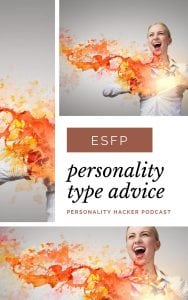Download Episode Here – right click link and select “Save Link As…”
In this episode Joel and Antonia dive deep into the needs and desires of the ESFP personality type.
In this podcast on the ESFP personality type you’ll find:
ESFP – Sensation/Authenticity in the genius system
ESFPs get a bad rap in Myers-Briggs communities because it is easy to dismiss them as two-dimensional or flighty.
The driver process is Extraverted Sensing (Se), which we have nicknamed “Sensation.”
Sensation is a perceiving or learning process and it is how they take in information.
Sensation is a real time interactive experience with the world around you using your senses.
All of us have this capacity, but as a driver it means it is super charged. All senses are heightened.
ESFPs don’t miss a thing. Crazy observant.
Very sensual. Athletic. Indulgent.
They like to be entertained and they like to be entertaining.
They may not get taken seriously because they show up so playfully.
The co-pilot is Introverted Feeling (Fi), which we have nicknamed “Authenticity.”
Fi is incredibly deep, highly introspective and more in touch with the emotional state.
The more an ESFP develops self and learns to understand who they are and what their convictions are the deeper they become as people.
There is a part of them that wants to go inside and be introspective.
ESFPs are very in touch with their bodies and they use their bodies as an instrument to determine what feels right or wrong.
They have a superpower for helping the world get in touch with the kinesthetic abilities of our bodies.
Fearless. Effortless physically.
We get a lot of benefit from ESFPs – lots of performers, comedians, athletes, etc. They help us understand what is possible in regards to the physical pursuits.
Not a lot of narrative to their learning initially, they are just interested in experiencing something fully, in the present. Initially it is just about the experience.
People can superimpose their stories upon why an ESFP is doing something and that can be hurtful to the ESFP because their intent wasn’t based upon any narrative. They are just eager to experience.
Their copilot of Authenticity (Fi) asks what feels right to the individual. What feels good – kinesthetically, personally, emotionally? What feels ethically right, or morally right?
Fi helps them ask if they are showing up the way they want. If they are giving the impression they want.
ESFPs say they love the feeling of falling in love, but once the relationship begins things become humdrum and they get bored and want to find that initial thrill again.
So they need to shift the question from what feels good to what feels right. This will extend the timeline to move past the humdrum spots and find the potential in the future.
ESFPs have a weird relationship with approval, so they often outsource their values to other people and get stuck adhering to values that aren’t authentic to them.
ESFPs need to ask themselves:
- What is it in your life that you are doing that is unacceptable to you?
- What is the life you want to be living?
- What are you not giving yourself permission to do that is having you ignore other values that are much closer to who you are?
Make sure that all of your decisions in your life (job, paradigm, relationships, etc) are resonating with the core of your being, or you will find yourself doing things that you aren’t proud of just to survive.
ESFPs 10-year-old process is Extraverted Thinking (Te), which we have nicknamed “Effectiveness.”
ESFPs have a tendency to skip their copilot and go to their 10 year old, another extraverted process.
Fi is a slow process. It is introverted. It takes meditative thought to know what feels right.
Te gives the ability to make quick decisions on info. But the decisions aren’t going to be very sophisticated because Te has the maturity of a 10 year old.
The true growth for ESFPs is getting in touch w/ authenticity. Turn off video games, media, sensory experiences and get in touch with how you resonate with things.
The world loves Te, so there’s a lot of encouragement to go to that process.
ESFPs have to fight that if they are neglecting Fi in behalf of Te.
If you aren’t neglecting Fi, then Te can be a very effective helper.
One of the stereotypes around ESFPs is their playful nature, yet they are hard workers. Se married to Te will work till they collapse. Physical work. An ESFP desk jockey will be miserable.
ESFPs have more stamina than most people.
One challenge they have is in saving and planning for the future
The 3-year-old process is Introverted Intuition (Ni), which we have nicknamed “Perspectives.”
Ni is about future pacing – the very opposite of Se.
A lot of survey results indicated that future pacing was a struggle. Planning more than 3 weeks ahead. Saving money.
When we are talking about an area that is a blind spot we need to outsource what we are struggling with. Call in other people to help.
We are influenced by the three year old in ways we can’t see. For ESFPs the Ni can be a source of fear. Paranoia. Conspiracy. Fears of Betrayal. Not necessarily legitimate fears.
Get out of that paranoid space and get back into sensation. Verify the legitimacy. If there’s no reason to fear the future then don’t worry about it.
Give your 3 yr old some attention by doing meditation. Some body builder ESFPs will actually enter a meditative state while working out.
Allow yourself to enjoy harmless intuitive pursuits, like daily horoscopes, crystal healing.
Interpreting people’s body language is a great combo of Se and Ni.
ESFPs are often labeled shallow, but the world will see their depth if they get into the Authenticity process.
All of us have a vetting process to determine whether or not we want to be intimate with people. ESFPs are looking for playmates. Then they will allow people to see their depth.
To subscribe to the podcast, please use the links below:
Subscribe with iTunes
Non iTunes Link
Download The Android App
Subscribe on Soundcloud
Subscribe with Stitcher
If you like the podcast and want to help us out in return, please leave an honest rating and review on iTunes by clicking here. It will help the show and its ranking in iTunes immensely! We would be eternally grateful!
Want to learn more?
Discover Your Personal Genius
We want to hear from you. Leave your comments below…



Share:
Podcast - Episode 0093 - Sensing Personality Types
Podcast - Episode 0095 - ISFP Personality Type Advice
23 comments
Thanks for your comment Stephen! You’re right. All ExxPs have a need for unfettered freedom. Their greatest fear is being stuck.
Ha! Thanks Randy! It sounds like all of us need such a friend.
Thanks for the comment Authentic! We notice relationships run into conflict when they don’t share the N/S and P/J dichotomies. N/S impacts our communication style. P/J impacts our organization style. They are better shared. Although relationships do succeed when they are not shared if both partners are set upon growth and mutual understanding.
Since most relationships need some sort of polarity, we find the E/I and T/F dichotomies can be opposed with little difficulty.
So, with this basic model in mind, the ideal relationship for you would be an ISTP. But, this in no way takes in consideration individuals and their levels of growth. We each need to answer for our own needs and desires.
After listening to this, I am realized that my best friend is an ESFP (I’m an ENTP)! Whenever I go somewhere with him, there is almost always at least one person who knows him, and he really is like a walking party haha. I also know at least a couple of other female ESFPs who are really great people. This type really is one of my favorites (I’m personally biased towards EPs haha) because they have a tendency to balance me out by keeping me grounded in reality and inspiring inward warmth. They aren’t shallow at all. It’s interesting how we struggle with similar issues of intense dislike of the daily grind of life and things like planning ahead (though not really to the same degree).
I’m an INFP writing an ESFP main character at the moment. I love ESFPs and I really want to do justice to that type by creating an accurate character. This really helped! I was also very intrigued by the concept of first points of entry/vetting processes and how we each have a way of testing the people around us. I was wondering if you could maybe talk about what these are for all the types.